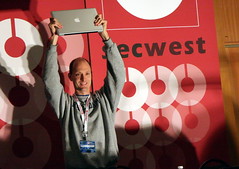It's been nearly a year now since I created Linux Advocates. I am reflecting on what has happened during the past year and appraising what changes I need to make that might make Linux Advocates more effective in terms of its advocacy.
As the website domain name implies, it is all about advocating for the use of Linux. That is obvious but subtle at the same time.
In doing advocacy, I have discovered some things which have resulted in my making changes that seemingly run counter to the definition of advocacy.
Censorship
Over many years, I have learned from my personal experiences in website forums that readers come in varieties and types. Taking feedback over the past year on Linux Advocates, I have found it necessary to apply rigid censorship so as to keep trolling from ruling the comments section.
It became quickly evident to me and LA co-founder +Katherine Noyes that regardless of the cause, there is a sub-population who have no real interest in rational discourse on the topics at hand, who are merely intent to 'troll'. It is unfortunate, but, part of the landscape and without censorship, I have seen comment feedback quickly regress. So as to be effective in reigning in the trolls, full moderation has been on for over 6 months now. Largely, the trolls have gone elsewhere.
But it leaves me with a strong impression of the types of people out there who make 'hating' and 'trolling' a game of sorts, who feel by virtue of their anonymity that they are not accountable for their bad behavior. That is perhaps the most troubling aspect of today's Internet, along with privacy rights.
It represents a disconnect between how a 'normal' person would conduct his/herself in a public place and doing the same in a forum context. Psychologists will be studying this type of behavior for years.
So be it. Trolling is rampant, only I have filtered it out with censorship. I don't like having to do it, but it is absolutely necessary.
Tribalism
In the real world, when you come to work to earn a paycheck, inevitably, there will be some 'friction' during the day due to human interaction. Some conduct themselves in keeping with good business practices. Others depart from that and their professional comportment and/or diminished social skills impact on others who come into contact with them.Hopefully, you quickly identify who those people are and find ways to avoid unpleasant exchanges and get through your day. Some days, it becomes impossible.
Personalities get in the way even more so on the Internet. When it comes to professional conduct in the upstream software developer team setting, I have seen the worst kind of behavior one can imagine. Even the grand poobah Linus Torvalds has been charged with exhibiting unprofessional, vulgar behavior.
All it takes is one person in a position of 'authority' who controls a project to cause alienation to ripple downstream. The side-effect of such behavior in the Open Source community includes arrogance and those directly affected by the individual must quickly choose sides -- either adversarial or side with the 'bad behavior' and cliques quickly form. In psychology, the tendency to behave in cliques smooths out difficulties for the project unit but leaves the organization in a position of exhibiting tribalism towards outside developers who wish to advance a special software feature or change.
In fact, so as to preserve the purity and sanctity of this advocacy, I have had to discharge more than one contributor by virtue of their inappropriate behavior. It's not something I will ever tolerate from anyone.
The reputation of Linux Open Source has been given a 'black eye' by tribalism. It is very divisive, damaging and counter-productive to advancing the cause of Linux advocacy. I don't know what the future holds but while many upstream projects do not suffer from this malady, all it takes is one 'bad apple' to magnify and spread like a contagion. I hope things improve.
Living
Living. What do I mean by that? Everybody wants the same thing: Life, liberty and the pursuit of happiness. Living comes at a cost. Many currently around the globe are in the throws of economic turmoil. And when you can't pay the rent, you are even more less likely to have any inclination to write code for an Open Source project.That factors in for many who continue to dedicate themselves to Linux despite their life circumstances. They are to be commended for their resolve and fidelity. Others, simply by attrition, have either given up (Cloverleaf and SolusOS) or retired (Fuduntu). That is the harsh reality.
I have predicted that given the serious economic turmoil, there will be a major consolidation of Linux Distributions resulting in a rapid collapse. The result will be in the next five years only the strong will survive and that comes down to just a handful of base Distros. And that has been a major factor influencing my decision to use Fedora -- they will be around.
Conclusion
I sincerely hope to continue providing strong advocacy for all things Linux with original and meaningful content. I want to thank the readership for visiting my website and hope they will continue to do so throughout the 2014 year. The average montly pageviews for 2013 was over 60,000.A very special thank you goes out to the Linux Advocate Contributors for their continued ongoing support.
Happy New Year Everyone,
Dietrich Schmitz
Linux Advocates, Site Owner

























































